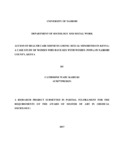| dc.description.abstract | Studies on the SOGIE worldwide and specifically in Kenya are unpopular mainly because homosexuality has been criminalized by law. As a result members of the LGBTIQ community are afraid of coming out regarding their sexual orientation and this is especially so when they need to seek out health care services. Considering that health care is a fundamental right enshrined in the constitution, it becomes a tough balance so seek out health services as a right and to risk exposure of their sexual orientation which is criminalized by the same constitution. Using the descriptive survey design, the main objective of this research was to examine the access of health care services among Women who have sex with Women (WSWs) in Nairobi County. In order to achieve this, the specific objectives were: to find out the specific health care needs WSWs are faced with by virtue of their sexual orientation; to establish the availability of health care services sought by WSWs; to examine the extent of accessibility of health care services by WSWs in Nairobi County; to investigate challenges that exists for WSWs in seeking health care services; and to identify copying mechanisms employed by WSWs in their seeking health care endeavors.
The study established that the top three health needs among women who have sex with women are STI and STI testing, psychological issues and HIV testing. Treatment however of these conditions while available at no cost in public health centers is often not sought out by LGBTIQ individuals because of experiences of past discrimination or perceived homophobia within the prevailing health care system. Majority of the respondents reported to having unmet health needs, while a smaller percentage reported to having their health needs met in spite of their sexual orientation. The research established that majority of the respondents had not received treatment in health care centers when the health personnel discovered their sexual orientation while a few reported to have received treatment despite their sexual orientation. Some of the challenges that WSWs reported to have experienced in their bid to seek out health care services were listed as follows: discrimination, stigmatization,, homophobia among health personnel and punitive laws against homosexuality. Due to the challenges experienced by WSWs in their health seeking endeavors, the study established that majority sought social support from organizations that champion homosexuals’ right, social media platforms among sexual minorities, ideas shared by other stakeholders through networks and seminars, health forums that accord open discussions and dialogue, social support offered by peers and other sexual minorities. | en_US |



